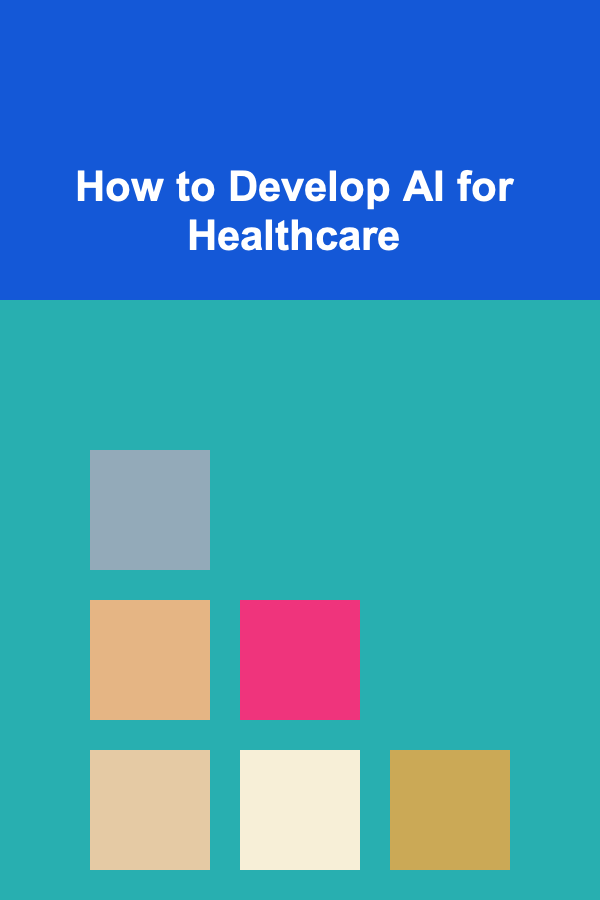
How to Develop AI for Healthcare
ebook include PDF & Audio bundle (Micro Guide)
$12.99$11.99
Limited Time Offer! Order within the next:

Artificial Intelligence (AI) has the potential to revolutionize the healthcare industry by improving the efficiency, accuracy, and accessibility of healthcare services. From diagnostic tools to personalized treatment plans, AI can play a vital role in enhancing patient care, reducing costs, and supporting medical professionals. However, developing AI for healthcare presents unique challenges that require a combination of technical expertise, domain knowledge, ethical considerations, and regulatory compliance.
This article explores how to develop AI for healthcare by addressing the core elements required, the challenges faced, and the methods to build AI systems that are both effective and safe for healthcare applications.
Understanding the Role of AI in Healthcare
AI in healthcare involves using machine learning, natural language processing (NLP), computer vision, and other AI techniques to analyze medical data, assist in diagnostics, predict patient outcomes, and optimize treatment plans. AI systems can process vast amounts of data far quicker than humans, providing insights that would otherwise be impossible to extract manually. Some of the key areas where AI is being implemented in healthcare include:
- Medical Imaging and Diagnostics: AI can be trained to detect abnormalities in medical images, such as X-rays, MRIs, and CT scans, often with accuracy comparable to or exceeding human experts.
- Personalized Medicine: AI systems can analyze genetic data and patient history to suggest customized treatment plans tailored to the individual's needs.
- Drug Discovery: AI helps identify potential drug candidates by analyzing large datasets, accelerating the research and development process.
- Predictive Analytics: AI can analyze patterns in patient data to predict disease progression, potential outbreaks, and other critical events, allowing for proactive healthcare management.
- Virtual Health Assistants: AI-powered chatbots and virtual assistants can provide 24/7 support for patients, answering medical queries and guiding them through treatments.
To develop AI for healthcare, it's essential to understand these use cases and the specific challenges each one presents.
The Data Challenge in Healthcare AI Development
The foundation of AI development in healthcare is data. AI algorithms require large volumes of high-quality, labeled data to be trained effectively. Healthcare data can include electronic health records (EHR), medical images, genomic data, lab results, patient demographics, and much more. However, working with healthcare data presents unique challenges:
2.1 Data Quality and Availability
The quality of healthcare data is crucial for the success of AI applications. Inconsistent, incomplete, or erroneous data can lead to inaccurate predictions and decisions. The healthcare industry often faces issues like:
- Fragmented Data: Patient data is typically spread across multiple platforms and healthcare providers, making it difficult to consolidate into a unified format.
- Missing Data: Medical records can have missing values due to human error or inconsistent data entry practices.
- Unstructured Data: Much of healthcare data, such as doctor's notes, is unstructured text that needs to be processed through NLP techniques to be useful for AI systems.
2.2 Data Privacy and Security
Healthcare data is highly sensitive, and its use is governed by strict regulations like the Health Insurance Portability and Accountability Act (HIPAA) in the United States and the General Data Protection Regulation (GDPR) in Europe. Any AI system developed for healthcare must ensure the confidentiality, integrity, and availability of patient data. The challenge here lies in:
- Data Anonymization: Ensuring patient data is anonymized while maintaining its utility for training AI models.
- Secure Data Storage: Ensuring that healthcare data is stored securely to prevent data breaches and cyberattacks.
- Compliance with Regulations: Ensuring that all data handling and processing comply with local and international healthcare regulations.
2.3 Data Annotation
For supervised learning models to be effective, they need labeled data. In healthcare, data annotation is an essential step where human experts annotate medical data, such as images or patient records, to mark specific conditions or events. This process can be time-consuming and requires domain knowledge, such as that of doctors, radiologists, or lab technicians.
AI Models for Healthcare
Developing AI for healthcare involves selecting and training the right models. Healthcare AI applications often use machine learning (ML), deep learning (DL), and natural language processing (NLP) models. Let's take a closer look at some of the most common AI models used in healthcare.
3.1 Machine Learning Models
Machine learning (ML) algorithms are a subset of AI that learn from data patterns to make predictions or decisions. Commonly used ML models include:
- Decision Trees: These are used for diagnostic classification tasks, where the goal is to classify patient data into categories based on decision rules.
- Random Forests: An ensemble method that combines multiple decision trees to improve prediction accuracy. Random forests are often used in healthcare applications for disease classification and risk assessment.
- Support Vector Machines (SVM): Used for classification tasks, such as determining whether a patient has a particular disease based on various features of their medical data.
- K-Nearest Neighbors (KNN): This algorithm classifies a new data point based on the majority class of its neighbors. It's often used in medical diagnosis tasks, where similar patient profiles are compared.
3.2 Deep Learning Models
Deep learning (DL) is a subset of machine learning that uses artificial neural networks with many layers to model complex patterns. It has shown impressive results in fields like image analysis and speech recognition. In healthcare, deep learning can be used for:
- Medical Imaging: Convolutional Neural Networks (CNNs) are highly effective for analyzing medical images like X-rays, CT scans, and MRIs. CNNs automatically learn features from the images and can detect conditions like tumors, fractures, or abnormalities.
- Natural Language Processing (NLP): Recurrent Neural Networks (RNNs) and Long Short-Term Memory (LSTM) networks are used for processing unstructured text data, such as medical records or doctor-patient dialogues. They help extract meaningful insights from text data and automate clinical documentation.
3.3 Reinforcement Learning
Reinforcement learning (RL) is an area of machine learning where an agent learns to make decisions through trial and error, receiving feedback from the environment. In healthcare, RL can be used for optimizing treatment plans or managing patient workflows. For example, RL can be employed to:
- Personalized Treatment: RL can help design individualized treatment regimens based on the patient's response to therapy.
- Healthcare Operations: RL can be used to optimize hospital operations, such as patient scheduling, bed management, and resource allocation.
Training AI Models for Healthcare
Once the appropriate data and model type are selected, the next step is training the AI model. Training healthcare AI models requires careful consideration of several factors:
4.1 Data Preprocessing
Before training AI models, healthcare data must be preprocessed to ensure that it's clean and usable. This involves:
- Cleaning: Removing duplicates, correcting errors, and handling missing values.
- Normalization: Scaling numerical data to a standard range.
- Feature Engineering: Extracting relevant features from raw data, such as transforming text into meaningful tokens or extracting key information from medical images.
4.2 Model Evaluation
After training, it's essential to evaluate the performance of the AI model. Common evaluation metrics in healthcare AI include:
- Accuracy: The percentage of correct predictions made by the model.
- Precision and Recall: These metrics are particularly important in healthcare, where false positives (e.g., misdiagnosing a patient) and false negatives (e.g., failing to diagnose a condition) can have serious consequences.
- AUC-ROC: The area under the receiver operating characteristic curve is used to evaluate the trade-off between sensitivity and specificity.
- F1 Score: The harmonic mean of precision and recall, which is useful when dealing with imbalanced datasets.
4.3 Overfitting and Underfitting
Healthcare AI models are particularly susceptible to overfitting and underfitting. Overfitting occurs when the model performs exceptionally well on the training data but poorly on unseen data. Underfitting occurs when the model is too simple to capture the underlying patterns in the data. To mitigate these issues, techniques like cross-validation, dropout, and regularization are employed.
Ethical Considerations in Healthcare AI
As AI becomes more integrated into healthcare systems, ethical considerations must be at the forefront of development. Some key ethical concerns include:
5.1 Bias and Fairness
AI models can inadvertently learn biases present in the training data, leading to unfair or discriminatory outcomes. In healthcare, this can result in certain patient groups receiving subpar care. To avoid this, it's crucial to ensure that the data used for training is representative of diverse populations and that the AI model is regularly audited for fairness.
5.2 Transparency and Explainability
AI systems, especially deep learning models, are often viewed as "black boxes," meaning it can be difficult to understand how they arrive at their decisions. In healthcare, it's essential that AI models be explainable to ensure that clinicians and patients trust the system. Researchers are working on developing explainable AI (XAI) techniques that allow for greater transparency in how decisions are made.
5.3 Accountability and Liability
When AI systems make errors in healthcare, it can be challenging to determine who is responsible. Is it the healthcare provider, the AI developer, or the manufacturer of the AI system? Establishing clear frameworks for accountability and liability is crucial for building trust in AI-powered healthcare solutions.
Challenges in Scaling AI for Healthcare
While AI has the potential to transform healthcare, there are significant barriers to scaling AI solutions across healthcare systems:
- Integration with Existing Systems: Many healthcare providers rely on legacy systems, and integrating AI solutions with these platforms can be complex.
- Regulatory Approval: Healthcare is a heavily regulated industry. AI solutions must pass rigorous clinical trials and regulatory approval processes before they can be deployed in real-world settings.
- Training and Adoption: Healthcare professionals may be resistant to adopting AI technologies due to concerns about job displacement or a lack of understanding. Comprehensive training and support are essential for successful implementation.
Future of AI in Healthcare
The future of AI in healthcare is promising. With advancements in technology, greater data availability, and continuous research, AI will play an increasingly important role in healthcare. Some key trends to watch include:
- AI-powered diagnostic tools: AI will continue to improve in diagnosing diseases, particularly in areas like oncology, cardiology, and radiology.
- AI-assisted surgery: Robotic surgery and AI systems are expected to become more refined, providing better precision and reducing human error.
- Healthcare personalization: AI will help tailor treatments to the genetic makeup and lifestyle of individual patients, improving outcomes and reducing side effects.
Conclusion
Developing AI for healthcare is a multifaceted process that requires expertise in machine learning, healthcare data, ethics, and regulatory compliance. By focusing on high-quality data, appropriate model selection, and ethical considerations, AI can be leveraged to significantly improve healthcare services, enhance patient care, and optimize medical practices. The potential for AI to revolutionize healthcare is immense, but it requires careful development and implementation to ensure its success. As AI continues to evolve, it will undoubtedly shape the future of healthcare in profound and transformative ways.

How to Maintain an Organized Recipe Collection Over Time
Read More
How to Use Real Estate Investment to Make Money
Read More
How to Understand the Hero's Journey (and How to Subvert It)
Read More
Finding Affordable Flights to Europe: A Comprehensive Guide
Read More
Designing Professional Resumes and Portfolios: A Comprehensive Guide
Read More
How to Develop a Business Plan for a Local Restaurant
Read MoreOther Products

How to Maintain an Organized Recipe Collection Over Time
Read More
How to Use Real Estate Investment to Make Money
Read More
How to Understand the Hero's Journey (and How to Subvert It)
Read More
Finding Affordable Flights to Europe: A Comprehensive Guide
Read More
Designing Professional Resumes and Portfolios: A Comprehensive Guide
Read More